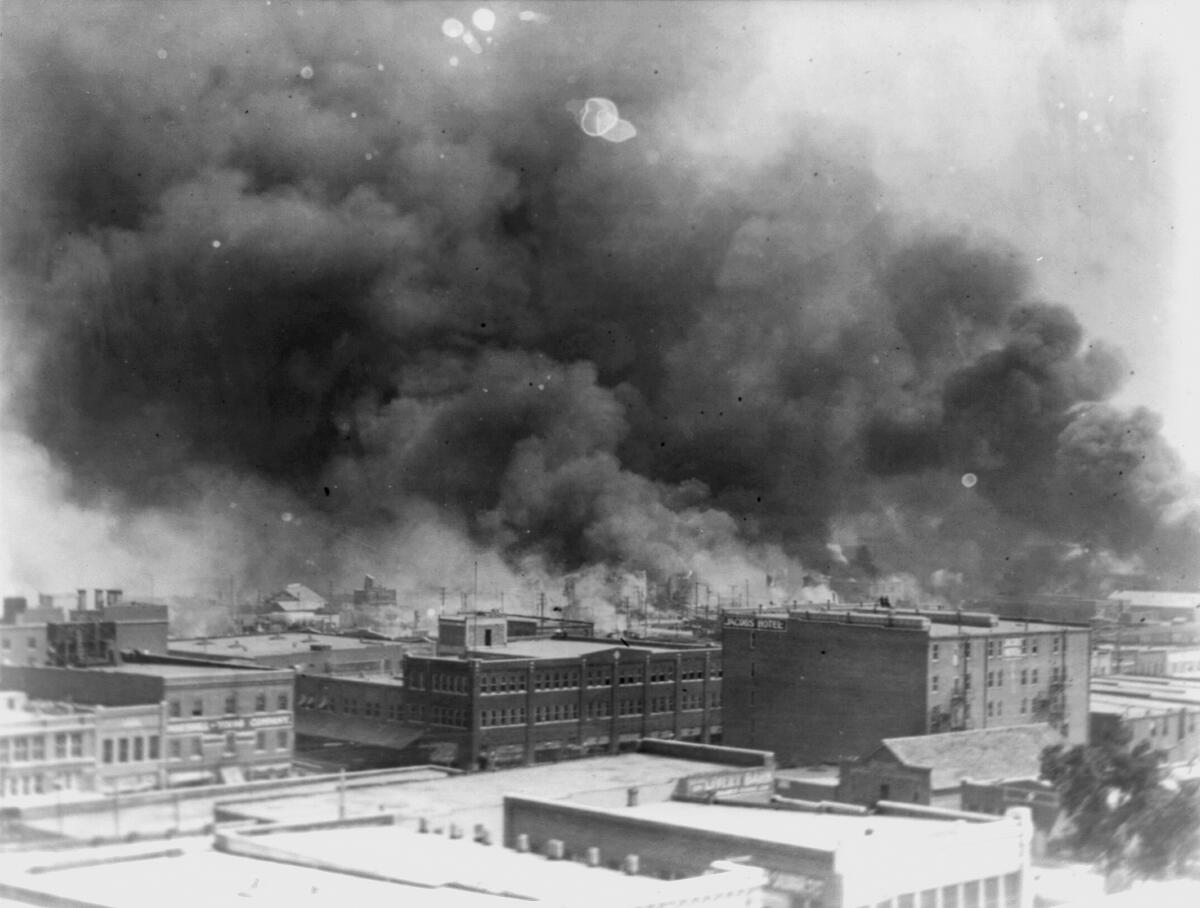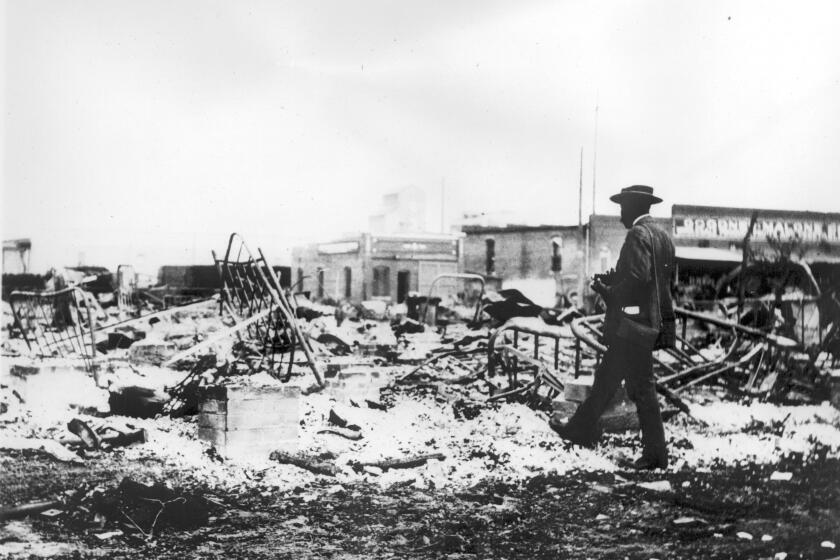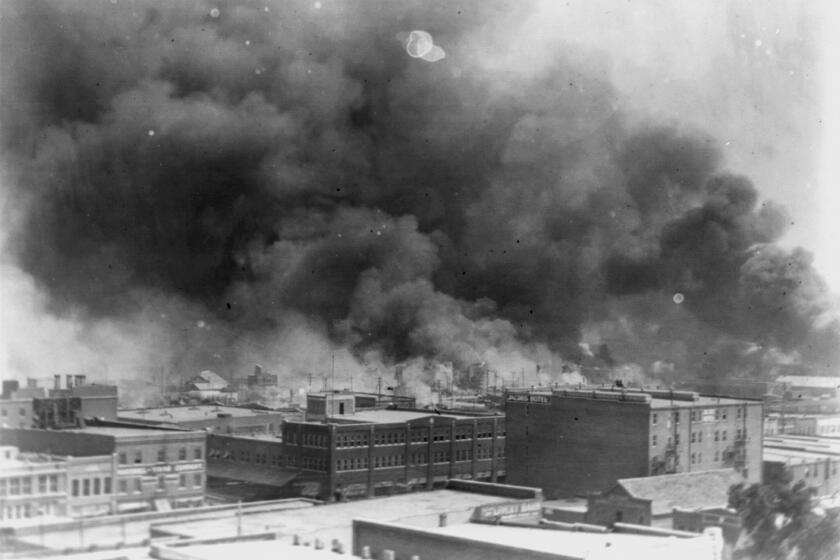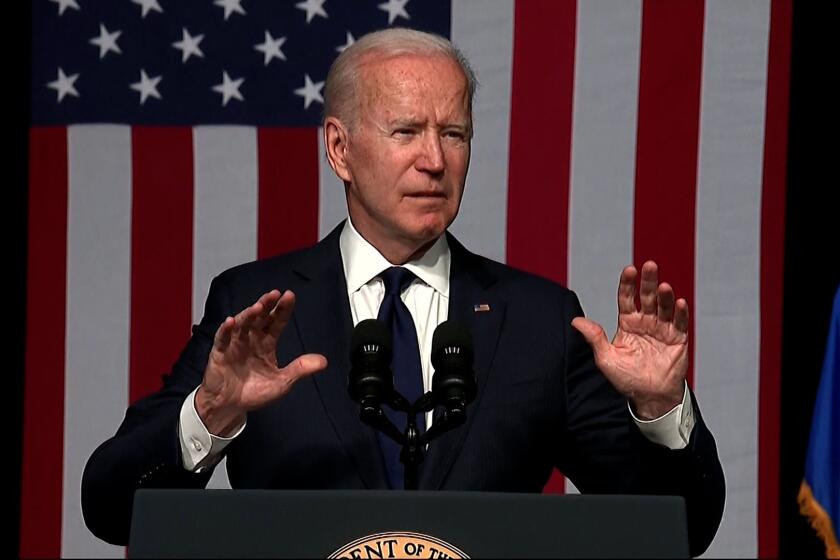Oklahoma’s high court will consider a reparations case from 1921 Tulsa Race Massacre survivors

- Share via
OKLAHOMA CITY — The Oklahoma Supreme Court will consider a reparations case from survivors of the 1921 Tulsa Race Massacre after a lower court judge dismissed it last month, giving hope to advocates for racial justice that government may make amends in one of the worst single acts of violence against Black people in U.S. history.
Tulsa County District Judge Caroline Wall dismissed the case on July 9. Survivors appealed and the state’s high court agreed last week to consider whether that decision was proper and if the case should be returned to her court for further consideration.
In response to the appeal, the state told the court Monday that it won’t consider a settlement with the survivors. The survivors want the state’s high court to return the case to district court to determine exactly what occurred and what it would take to fix or abate what they allege is a continuing nuisance created by the massacre.
Tulsa officials have announced plans to excavate a possible mass grave of blacks who were massacred in 1921
Just three survivors of the attack are known to still be living, all more than 100 years old. Lessie Benningfield Randle, Viola Fletcher and Hughes Van Ellis have sued for reparations from the city, state and others for the white mob’s destruction of the once-thriving Black district known as Greenwood. Several other original plaintiffs who are descendants of survivors were dismissed from the case by the trial court judge last year.
“The survivors of the Tulsa Race Massacre are heroes, and Oklahoma has had 102 years to do right by them,” their attorney, Damario Solomon-Simmons, said in a statement to the Associated Press. “The state’s efforts to gaslight the living survivors, whitewash history, and move the goal posts for everyone seeking justice in Oklahoma puts all of us in danger, and that is why we need the Oklahoma Supreme Court to apply the rule of law.”
The lawsuit was brought under Oklahoma’s public nuisance law, saying actions of the white mob that killed hundreds of Black residents and destroyed what had been the nation’s most prosperous Black business district continue to affect the city’s Black community. It alleges that Tulsa’s long history of racial division and tension stemmed from the massacre.
A judge has dismissed with prejudice the lawsuit trying to force Tulsa to make recompense for the destruction of the Black district known as Greenwood.
But the state says that argument was properly dismissed by Judge Wall. The judge properly determined that the plaintiffs failed to outline a clearly identifiable claim for relief, Assistant Atty. Gen. Kevin McClure wrote in the state’s response to the appeal.
“All their allegations are premised on conflicting historical facts from over 100 years ago, wherein they have failed to properly allege how the Oklahoma Military Department created (or continues to be responsible for) an ongoing ‘public nuisance,’ McClure wrote.
McClure claims the state’s National Guard was activated only to quell the disturbance and left Tulsa after the mission was accomplished. The survivors’ lawsuit alleges National Guard members participated in the massacre, systematically rounding up African Americans and “going so far as to kill those who would not leave their homes.”
Biden marks the 100th anniversary of the massacre that wiped out a thriving Black community in Tulsa.
Solomon-Simmons said the state’s response denies the need for restorative justice for Black victims.
“We have people that suffered the harm that are still living, and we had the perpetrators, the city, the state, the county chamber, they are still here also,” he said. “Yes, the bombings have stopped. The shooting has stopped. The burning has stopped. But the buildings that were destroyed, they were never rebuilt.”
The attorney general’s office represents only the Oklahoma Military Department. Tulsa officials have declined to discuss the appeal, citing the ongoing litigation. A Tulsa Chamber of Commerce attorney previously said that the massacre was horrible, but the nuisance it caused was not ongoing.
In 2019, Oklahoma’s attorney general used the public nuisance law to force drugmaker Johnson & Johnson to pay the state $465 million in damages for the opioid crisis. The Oklahoma Supreme Court overturned that decision two years later.
More to Read
Sign up for Essential California
The most important California stories and recommendations in your inbox every morning.
You may occasionally receive promotional content from the Los Angeles Times.













